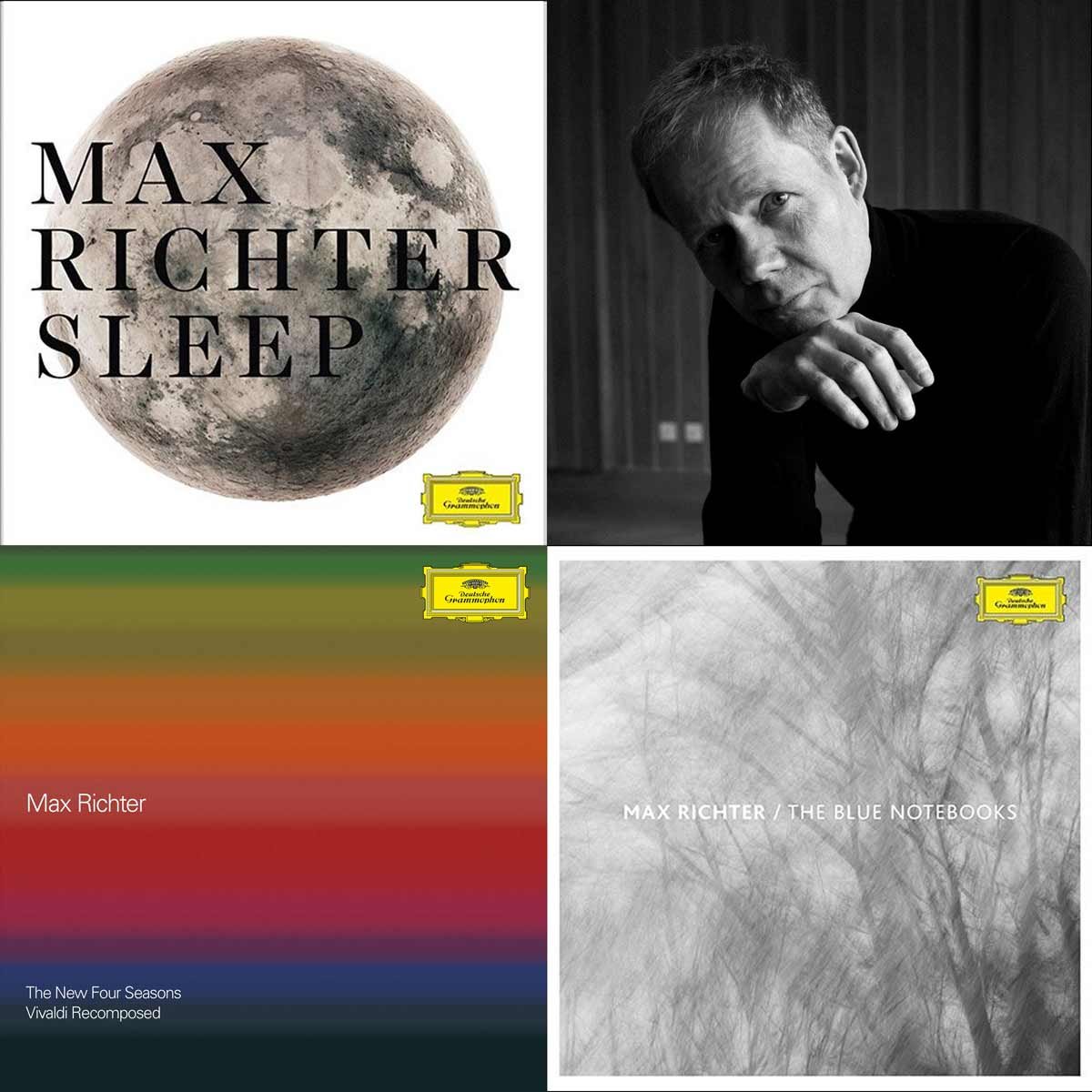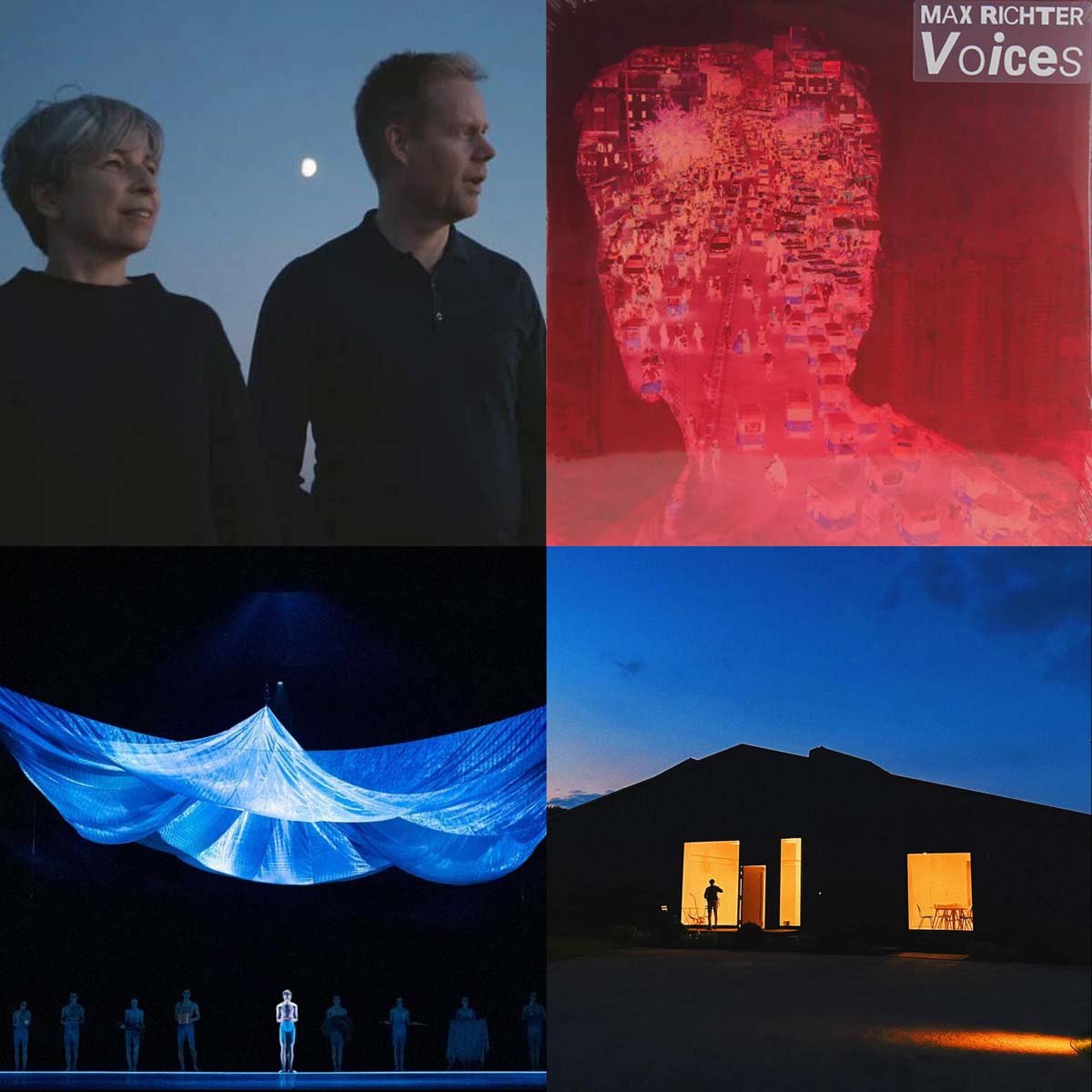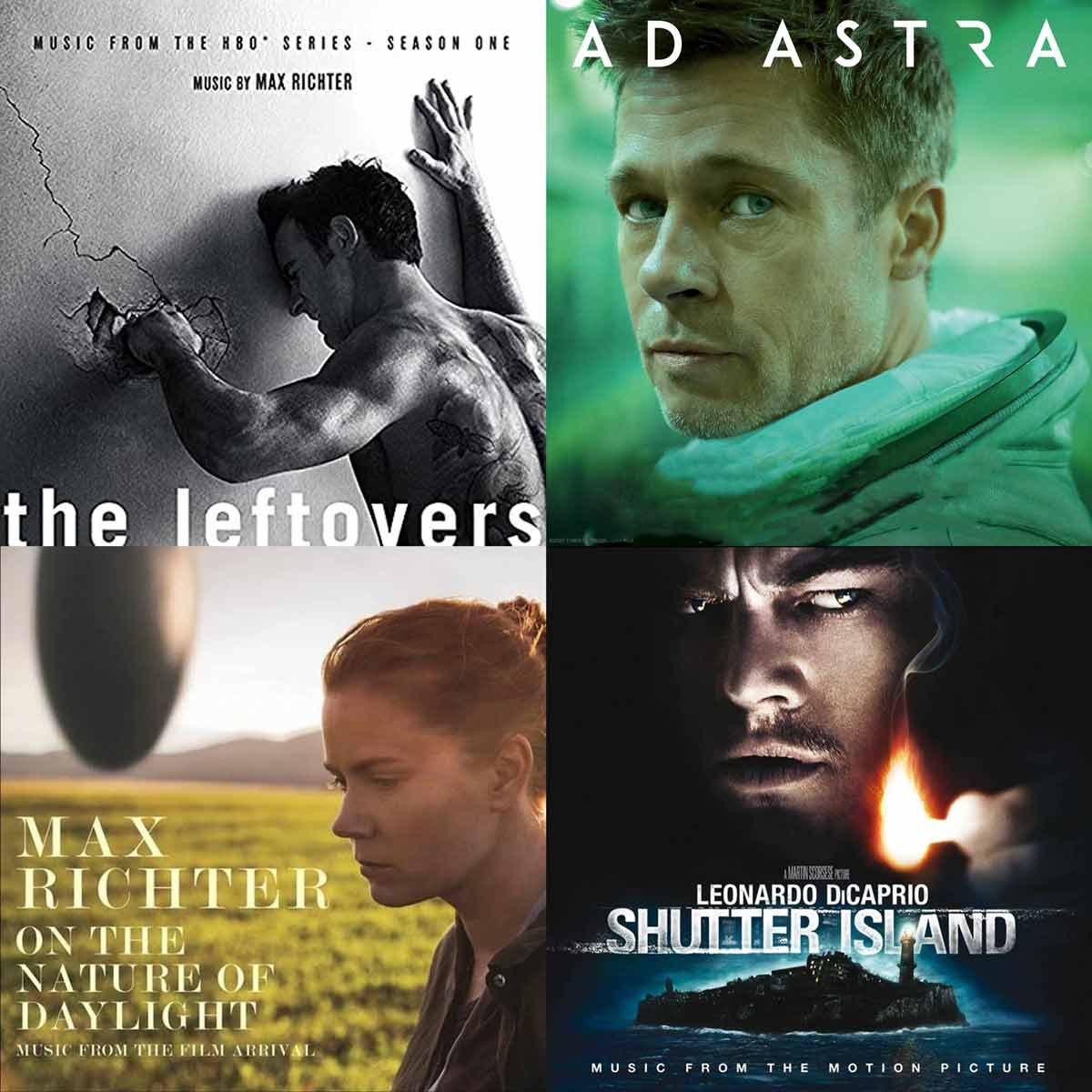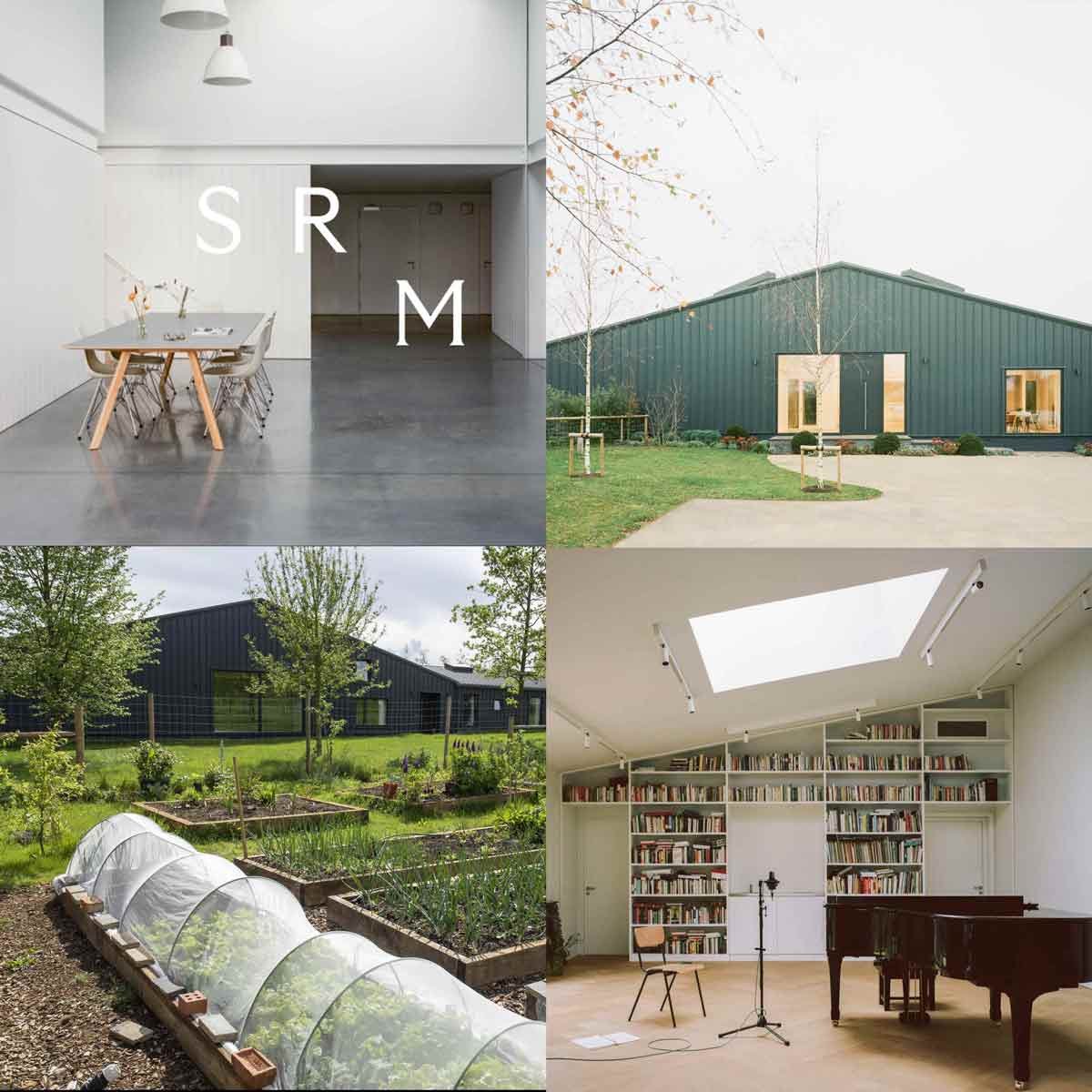Composer Max Richter is known for his ability to translate profound human emotions into music. Max’s record Sleep is the most streamed classical album of all time and his catalogue has surpassed 3 billion streams. A prolific collaborator, he scored and performed for Kim Jones for the Dior shows, and the new Wayne McGregor and Margaret Atwood ballet MADDADDAM, and arts collective Random International on the Rain Room installation. Max has collaborated with film directors Denis Villeneuve, Martin Scorsese, and Ari Folman, and scored film & TV including Ad Astra, Black Mirror, Shutter Island, The Leftovers, Arrival and his Emmy-nominated score for Taboo.
He’s the co-founder of Studio Richter Mahr, with his partner and artist Yulia Mahr in Oxfordshire, UK. Max and Yulia built the studio around an old tractor barn, and have powered it with cutting-edge solar and heat-pump technology. It’s a haven for their family and community of musicians and artists which regularly come through. Set within 31 acres of woodland, Max and Yulia have a huge passion for using the land to farm and provide a sustainable working environment as well as using creativity as an elevating force within society. Operating as a free space for artists to develop their work, the studio also works with local partners to support the local community.
THE CREATIVE PROCESS · ONE PLANET PODCAST
I was wondering what is it like when you're kind of chasing an idea. When you're kind of hearing it, and it's almost complete, and there's this pursuit. Does that even the momentum of creation end up in the work itself?
MAX RICHTER
For me, the creative process is a sort of a continuous thing in the sense that I'm writing kind of all the time, at some level. And that doesn't mean I'm sitting at my desk all the time, but it does mean that I've got a continuous thought process, a continuous engagement with the material I'm trying to shape. And it's many different kinds of processes. First of all, obviously an intention. You need to have an intention. What is it I'm trying to do? But then you get a process of making things, and then you get into a process of dialogue with the things you've made where they start to take on properties and it feels like the material has intentions of its own.
So then you are trying to - it's like herding cats, you know? - sort of corralling this material into some kind of structure, some kind of formed object. Then it becomes like a sculptural process on the large scale.
But at the small scale, of course, there's still a sort of a quite technical situation happening to do with how the notes are sort of woven together to give rise to larger structures. So there's all of those kinds of processes. And then there's also a lot of patience and listening involved, you know? So I've made something, what is it really? Leave it aside for a week, a month, a year, and try to see it for the first time. So it's a little like composting, you know, in the garden when you've got stuff and you just put it all on the heap, and then later on, let's see what's in that heap?
But time is a super important part of that process. You know, there are things which are just not ready. And you have to just wait until they make sense to you in a new way, or you can discover them almost as though someone else had written them. That sort of trying to achieve a kind of objectivity about the material.
Yulia Mahr, Max Richter, Voices, Wayne McGregor & Margaret Atwood ballet MADDADDAM, studio richter mahr
THE CREATIVE PROCESS · ONE PLANET PODCAST
I very much like that idea of continuous creativity, almost as though the work could already exist somewhere out there, you know, perfectly realized, and you just have to tap into this conversation that's taking place. So it's this sculpture, it's beautiful to think of a sculpture of music, something that doesn't necessarily have a physical form, and yet it has every form since it travels everywhere, like water.
RICHTER
You know, so much of it is about trying to get to a situation where you can sort of uncover the work. It is sort of out there, and it's about having enough patience, peace of mind, concentration, and opportunity to kind of let it come into the foreground somehow. I think Picasso says that: "I hope that when inspiration strikes, it finds me sitting in the chair." You know, so you do have to be in the chair in order for that process to happen. Or in some way in the chair, maybe not literally, but you need to be ready.
I mean, certainly, as creative people, we experience that. Creative work in some way feels like a dialogue with something else. But you know, whether that's something else that is kind of out there, or whether that's something else that is actually just a part of our mind which is normally inaccessible to us, it sort of doesn't matter, in a way. It's sort of not important. But I do think that feeling of there being a dialogue or some sort of inquiry into something else, that's fundamental to creativity.
So again, it's something which is about tabula rasa, something which is about fundamentals, things which are universal, kind of the origin of being, in a way. So all of these sorts of gestures, all of these kinds of ideas in Sleep, they all point to the idea of sleep as being, in some ways, a negotiation. A conversation between a kind of existence and non-existence, you know? "Our little life is rounded with a sleep." You know, this idea of being a kind of fundamental state. So all of the musical language, all the musical objects suggest that sort of feeling. And I think we all need that. We all need to connect to these fundamentals, to the big things which are sort of pre-civilization, the things which are before all the noise, the things which are shared, very simple human experiences.
I think there's something about our culture which sort of erodes those connections to those experiences. And I think particularly large-scale creative works can allow us to reconnect to them because they feel like alternate realities. So when you go to a Sleep performance, you are entering a kind of a different world.
You are, as an audience member, you've made a decision to go into a room with 500 people and be vulnerable, going to sleep with strangers in this kind of altered space, altered state. And it's a kind of community which goes on a journey together. So all of these basic human things are encapsulated in the piece.
THE CREATIVE PROCESS · ONE PLANET PODCAST
And you spoke of sources, literary sources. And of course, Yulia your partner is a visual artist.
RICHTER
Sleep was a great long conversation between us. You know, we've sat around over the kitchen table for 20 years having ideas and talking to one another about creative ideas and approaches to how creativity can sit in the world, and what should we do next.
And how is her work going? And how is my work going? I mean, this is what we do. So if we're talking about sources, then I guess that's really the primary source. And then of course we're also on our own creative journeys, exploring, researching, and thinking.
THE CREATIVE PROCESS · ONE PLANET PODCAST
And you mentioned this dialogue, this interplay where when the music is in service or in dialogue with your film and television work. How does that process begin for you?
RICHTER
I only do cinema and film and TV projects which really matter to me, where I think that it's important, there's something being said here which I want to support. So mostly I will start with just making some sketches from the script.
Of course, it's a journey, and it's a fundamentally collaborative journey. So, once the images start to happen, then there's a whole dialogue process with the rest of the creative team about how music can best inhabit, support, and serve the rest of the material. And it's really a series of experiments. It's to do with keeping a very open mind, trying things, and seeing what happens. It's an exciting kind of collaborative laboratory experiment, I think, working on film and television, and I enjoy it, the sort of puzzle solving, the questioning. It's good fun.
STUDIO RICHTER MAHR
THE CREATIVE PROCESS · ONE PLANET PODCAST
Tell us more about the studio, and your principles in founding it. You have cutting-edge, solar-powered, heat pump technology and also engage extensively with the community.
RICHTER
So Studio Richter Mahr is a project which really is the outcome of an idealistic vision of how creativity can coexist with the broader community, but it's something that Yulia and I passionately believe in. We believe in the possibility of creative work having an elevating effect in society more broadly. And in a way, it's a laboratory. We're excited by other minds, other people with their own ideas, their own thoughts coming in. So it's a space where we can exchange ideas.
Well, Yulia is really important in everything I do because we have collaborated explicitly on some projects, for example, on Voices, that's very much the outcome of a million conversations we had. And she's made some beautiful visual material for that project. Sleep was a great long conversation between us. You know, we've sat around over the kitchen table for 20 years having ideas and talking to one another about creative ideas and approaches to how creativity can sit in the world, and what should we do next. And how's her work going and how's my work going? I mean, this is what we do. So if we're talking about sources, then I guess that's really the primary source. And then of course we're also on our own creative journeys, exploring, researching, and thinking.
A piece like Voices, this comes out of conversations Yulia and I were having in 2017, 2018 in a sort of Trump era, I guess, where you just think, hang on, this isn't right. What's going on here? Okay, so in the way that somebody who isn't an artist, they would just say that to their friends. They would have a conversation, "I don't like what's happening here. This is all wrong." Well, as artists, we also want to have those conversations. We also want to convey our thoughts and feelings about the world we're living in. And it was very simple, in a way, an intuitive response to the things we saw happening around us in our daily lives. Artists are of course just ordinary people, too. And it so happens that instead of having a conversation or having a coffee with a friend, making a piece of music about it - it's the same impulse.
At the studio, we're trying to make it as 360 degrees as possible. So the center of the building is a cafe, and that cafe is fueled, if you like, from the organic garden. So there are no food miles. We grow everything. The electricity comes from the solar on the roof. The building itself was upcycled from a big old tractor shed. And we took the insides out and put new insides in, which are all the studios.
It's a challenging time, I feel like the next half a dozen decades maybe are the kind of pinch point where things can either start to get better or a lot worse. And that's to do with large-scale ideas about what society is and what it should do. And how we distribute wealth, power, opportunity, education, and creativity. And creative work, I think, can be a catalyst that can help us to see bigger contexts, and engage with deeper meanings. And these are all ways to figure out what's important and what isn't important. So our children, they're facing probably some of the biggest challenges we've ever faced, in the way, they're existential.
You know, Beethoven, somebody who lived 250 years ago, makes my life better just every day. It's not huge, but it's a little bit better every day. And I think that's what creativity can do. And, if you multiply that across time and populations, you can make a little change, and I think that's what creativity can do.
THE CREATIVE PROCESS · ONE PLANET PODCAST
And you also work with schools because we often try to separate the arts from STEM, but especially with music, we find more and more of our participating students at universities who study while listening to music. It helps them concentrate. We need to find more ways, like yours of bringing the arts to STEM and local communities.
RICHTER
The idea of the studio connecting with the local school, it's not like everyone has to be a musician, but even if you're not a musician, having the experience of being around music is a positive. It is a gain, it's a thing which just seems to illuminate the rest of life in some way. Again, it goes back to the sort of puzzle of how music works and what it is we were talking about at the beginning. There's something about being around music or being involved with it in whatever way that just seems to lift everything else up. And I think, if we can offer that to local kids, then we should do it.
THE CREATIVE PROCESS · ONE PLANET PODCAST
Going back to your beginnings, It was around 2002 with your solo debut of Memoryhouse, and after that, you started to gain acclaim and recognition at this time in the Neoclassical genre. Could you elaborate on that time and how that impacted your career?
RICHTER
Memoryhouse was a project that I had been kind of cooking for a long time. In a way, it was an experimental piece to see if the kind of things I wanted to do musically could be used to tell stories, to communicate. In a way, it was a sort of will it fly question. You know, is this actually a thing?
And the impetus for it really was to do with the fact that classical music culture at the time was very much tied to a kind of modernist orthodoxy, which is a kind of post-Boulez mindset where a piece of music was, in a sense, an intellectual manifesto rather than a sensory experience. You know, it was atonal. It was super complex. That was what orthodox classical music culture was. I didn't want to do that because I felt that music was a way of talking. And if I want to talk to people, then I need to use the language that they can understand. So that meant that I really was, if you like, exiled from mainstream classical music culture, which meant I couldn't get played or recorded. So I had to do this myself if I wanted anyone to hear what I was doing. And that's what Memoryhouse was really about. It was about finding a way to be heard without having to resort to this kind of super complex atonal music.
Memoryhouse itself, I felt, creatively did what I intended it to do. I felt like on a personal creative level, I felt encouraged that this idea about music would actually work. On a commercial level, it was a total failure, and really the only people who really got to know about it were other composers. We didn't have the opportunity to perform it for about 10 years.
So, you know, it was just a kind of a non-event in terms of the general public or even the listening public. Really, the only other people who heard it were other composers, other artists, and musicians interested in experimental things. So with that, if you like, failure, I thought to myself, well, this means sort of no one's listening, which means I can just continue doing exactly what I want because no one cares. So there's no, as it were, risk. There's no risk of failure because I've already failed. (Richter laughs.)
THE CREATIVE PROCESS · ONE PLANET PODCAST
Your projects engage with young people, so as think about the future, education, and the kind of world we're leaving for the next generation, what do you tell your children? And what for you is the importance of the arts? And what would you like young people to know, preserve and remember?
RICHTER
The world is very busy, and we tend to get a bit sidetracked by things that are not important. Creativity is a way to reconnect with important things. And I think the kinds of narratives, the kinds of perspectives that we put into the world with creativity can be a way to elevate the gaze a little bit. And it's true that literature is a big part of what I'm about in a way. I love stories, music, literature, visual art… These are ways to experience how another mind encounters the world. And that, for me, is really the most exciting thing about when you are reading a piece of writing by someone or you are seeing a piece of visual art – you are seeing a window into that person's encounter with reality. That person's biography. What things mean to them. And then you can compare notes with that person. How is it that person sees these things, and how do I see these things? And it's a way to understand one another. And I think that's really one of the most important things that creativity does in our world.



















































































